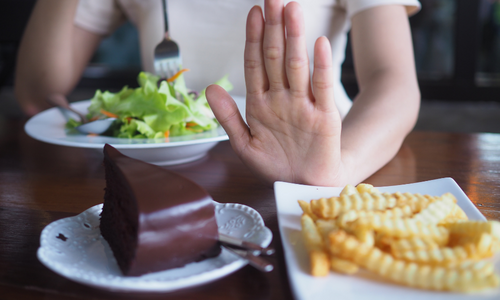What Are Processed Foods?

Issue No. 41 | Brought to you by the Addiction Reset Community – ARC
Unlocking the secrets of processed food addiction and guiding you to find freedom from food and weight obsession.

One of the most common questions we receive in the Addiction Reset Community is: What are processed foods?
In short, processed foods harm us, while unprocessed foods heal and nourish our bodies. So it’s extremely important to know where that dividing line is.

Why learn more about processed foods?
When you can identify processed foods, you are able to:
- Save yourself from the consequences
- Radiate good health to others
- Stop mistaking processed food as healthy
- Give yourself time to recover from processed foods
- Filter out deceptive media and marketing
- Stand your ground against confusion
How are foods processed?
Within the context of processed food addiction, Dr Joan Ifland (PhD), author and editor of the textbook Processed Food Addiction: Foundations, Assessment and Recovery, describes processed foods as those which have undergone processing in one or more of the following ways: condensing, liquifying, blending, aerating, powdering to flour, heating to high temperatures, crystalizing, distilling, removing fiber, filtering, centrifuging (spinning to remove elements), extracting, refining or artificial browning.
How are drugs processed?
When one compares the processing of food, to the processing of drugs, an undeniable similarity emerges. Drugs are processed through condensing, liquifying, blending, making syrup, pulverizing into powder, heating to high temperatures, crystalizing, distilling, removing the fiber, filtering, centrifuging, or extracting.
What is not considered to be processed food?
The following is not considered to be harmful processing of foods: chopping; grinding meat, adding heat for cooking, adding powdered spices, frying/sautéing, freezing, steaming, baking, mashing (individual assessment to determine if it triggers cravings or overeating), baking or fermenting (caution the salt).
7 Major categories of processed foods
- Sugar/sweeteners/alcohol
- Gluten/flour
- Excessive salt
- Dairy
- Processed Fats
- Caffeine
- Food additives
.. and combinations of the above
Some unprocessed foods may trigger addiction
It’s also important to mention that there are some foods that are not processed, but they may trigger cravings, sickness or result in overeating and should be assessed individually. These include dried fruit, high-sugar fruit, nuts, unprocessed foods that are associated with addictive foods and allergic foods.

Next Issue: Consequences of eating processed foods
The negative effects of eating processed foods are undeniable, The research shows that over 100 illnesses and diseases are associated with these foods. There is a wide spectrum of consequences across the various categories of processed foods. I
In the next issue of this newsletter, we will uncover what research studies reveal as the consequences of eating processed foods.

Within the Addiction Reset Community (ARC) our members and their journeys are important to us. We find their stories inspiring and hopeful for everybody in health recovery.
“I am so thankful for Joan Ifland’s program. For the first time in my life, I have found a group that understands my relationship with unprocessed foods and even more importantly, has a solution. Joan’s expertise is astounding. She has such a welcoming nature and understands that each person is an individual coming from a different platform. Although I realize this is just the beginning of healing my compulsive overeating after 45 years of searching, I am so thankful for the program."

Many people reach out to Joan asking for advice and assistance on how they can begin their recovery journey.
Dear Joan:
I resisted spending money on recovery, believing that it was expensive and unaffordable, So actually saving money was an unexpected surprise of coming into recovery and eating a clean food plan. The money I saved in one year on not eating out or bingeing was over $1,500! That is not counting the money I have saved on over-the-counter medications and sick days from my job. Thank you!
Joan responds:
Congratulations to you on investing in your recovery. I’m so glad to hear of the financial benefits you are experiencing.
Yes, the marketing tactics of big food companies include producing cheap food-like substances, making them easily available and advertising them as affordable. By contrast, the addiction persuades us that recovery is expensive. The fact is, that processed food addiction is very expensive to maintain for a lot of reasons.
The foods cost, and over time, we need to eat more and more. Then we lose income because we're too sick to work, and as you have mentioned, we spend more on medical treatments and pharmaceuticals. We also spend aimlessly on unnecessary shopping, looking for relief from pain. Recovery from processed foods addiction is not only cost-saving but life-saving too.
DISCLAIMER:
Dr Joan Ifland (PhD) is a global expert on the subject of processed food addiction and is not a medical doctor. Information and response shared in this Newsletter are not intended for, and should not be construed as medical advice.
Do you have a question? Reach out to us with your questions about food addiction and recovery at gethelp@foodaddictionreset.com
Are you showing signs of Processed Food Addiction? Take this self-quiz to find out now!
Recent copies of Dr Joan Ifland's Blog:
Issue 01 | Issue 02 | Issue 03 | Issue 04 | Issue 05 | Issue 06 | Issue 07 | Issue 08 | Issue 09 | Issue 10 | Issue 11 | Issue 12 | Issue 13 | Issue 14 | Issue 15 | Issue 16 | Issue 17 | Issue 18 | Issue 19 | Issue 20 | Issue 21 | Issue 22 | Issue 23 | Issue 24 | Issue 25 | Issue 26 | Issue 27 | Issue 28 | Issue 29 | Issue 30 | Issue 31 | Issue 32 | Issue 33 | Issue 34 | Issue 35 | Issue 36 | Issue 37 | Issue 38 | Issue 39 | Issue 40


